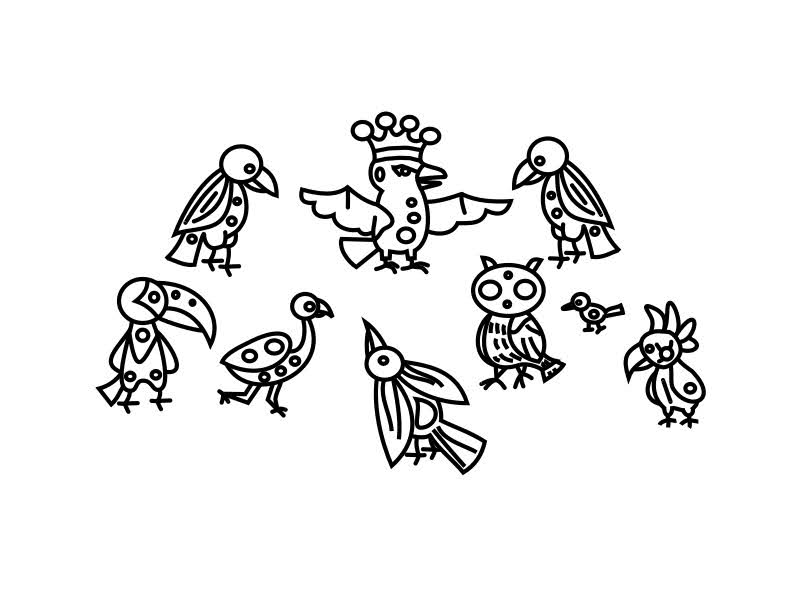Parliament of Fowls
11 August 2022

(based on an illustration from A Book of Roxburghe Ballads, by John Payne Collier, 1847).
The dynamic of the garden changes every year, but this year the birds have a confidence reminiscent of lockdown.
They feed while we sit and watch, and they squabble in the trees above our heads. The blackbird bathes in the hedgehogs’ water dish. The sparrows make dust bowls in the leaf-litter left for the frogs. The squirrel fears the pigeon, and the robin supervises our every move.
Sometimes there is harmony. The smaller birds know each other well and will blithely feed with other small species: coal tits and blue tits, chaffinches and dunnocks. The great tit and the nuthatch both take the peanuts, prising them whole from the net. The solitary wren does a morning round, hopping between baskets and grubbing in crevices. The goldcrest flits through the wild cherry, snapping at who-knows-what, swift and resolute. They may all have hatched in this garden; they have the air of people who went to school together.
Sometimes long-tailed tits politely pick at the fat balls, and at other times small families of greenfinches pass through, sampling the seed on their way to a more exciting location. Rooks live in the woods, but seldom come to call. Rarely, the bullfinch arrives. Rarer still the jay. This morning, a sparrowhawk glared from the roof outside my window just as I opened the blinds. Yet hers is not the only dominant personality here; lately, a possible potentate has emerged.
As a product of the nouveau riche, (the magpies who moved into the conifers), he’s raucous and entitled. He struts through the grasses but swings precariously when he grips the archway, as if he can’t quite master balance. His new shirt is very white and very clean, and his top hat and tails are sleek and black with an iridescent stripe along the wing. But he wears his hair tufted at the back and his mother watches him from the fence.
His arrival into the world was dramatic. One Saturday morning in late May, we woke to doleful chirping and rapid scolding. Isolating the source to the bottom of the garden, we found a baby magpie hiding under the trampoline while his parents issued a hail of criticism; he had clearly fledged too soon. We left him alone, convinced he wouldn’t last the morning once the cats arrived. The castigation continued, but by lunchtime he was on the lower branches of the holly. By mid-afternoon, he was two feet higher. By evening, he was higher still and giving his parents some back chat.
Next day, expecting to see a massacre of feathers, we cautiously circled the holly. We found him even higher, smug and secure on his spikey throne. The elliptical leaves prickling about him, he knew he was safe from predators. Only intermittent ripostes and a pile of guano gave him away.
Within two days he had reached the top and began surveying his kingdom. He moved his royal residence to the bird cherry to the annoyance of the squirrels, whom he now berates in staccato as he issues decrees. When he deigns to visit the feeders, terrifying the doves, the other birds retreat into the honeysuckle. They hold endless councils that he is never invited to join. Even his parents no longer speak to him. He eats alone and he sleeps alone. He is both sovereign and subject in his singular realm.
Only the older birds in the constituency linger at the margins of his presence. They give him long looks, as if to say:
‘We remember you when you fell out of your nest. Parvenu. You won’t last the winter.’
I suspect they are wrong.
He’s an arriviste.
They are all at the edge of an autocracy. And its bill will be substantial, sharp, and strong.
